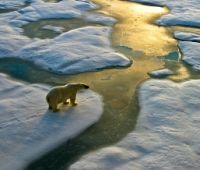

Research has shown that it is now too late to save summer Arctic sea ice, and scientists say preparations need to be made for the increased extreme weather across the northern hemisphere that is likely to occur as a result.
Analysis shows that even if greenhouse gas emissions are sharply reduced, the Arctic will be ice-free in September in coming decades, and if emissions decline slowly or continue to rise, the first ice-free summer could be in the 2030s, a decade earlier than previous projections.
The research shows that 90% of the melting is the result of human-caused global heating, with natural factors accounting for the rest.
Since satellite records began in 1979, summer Arctic ice has shrunk by 13% a decade, in one of the clearest signs of the climate crisis. Arctic sea ice reaches its annual minimum at the end of summer, in September, and in 2021 it was at its second-lowest extent on record.
Professor Dirk Notz, part of the study team at the University of Hamburg, said: "Unfortunately it has become too late to save Arctic summer sea ice.
"As scientists, we’ve been warning about the loss of Arctic summer sea ice for decades. This is now the first major component of the Earth system that we are going to lose because of global warming. People didn’t listen to our warnings".
"This brings another warning bell, that the kind of projections that we’ve made for other components of the Earth system will start unfolding in the decades to come".
Professor Seung-Ki Min, who led the new study at Pohang University, said: "The most important impact for human society will be the increase in weather extremes that we are experiencing now, such as heatwaves, wildfires and floods. We need to reduce CO2 emissions more ambitiously and also prepare to adapt to this faster Arctic warming and its impacts on human society and ecosystems".
In 2021 the Intergovernmental Panel on Climate Change (IPCC) concluded that the Arctic would not lose its summer ice if emissions were cut sharply and global temperature rises were limited to 2°C. But new research published in Natural Communications projects the loss of summer sea in the 2050s in the low emissions scenario.
The IPCC report concluded that the Arctic would lose its summer ice in the 2040s in intermediate and high emissions scenarios, but the new research advances that by a decade into the 2030s.
In the study, the scientists first established how much rising greenhouse gases have contributed to ice melting compared with natural factors, such as variations in the sun's intensity and emissions from volcanoes.
Notz said: "Humans really are to blame for almost all the loss of Arctic sea ice we have been observing".
The scientists used this information to model future melting and found that the models underestimated the pace of melting compared with observations of ice in the Arctic from 1979 to 2019. Calibrating the models to be consistent with the observations led to the projections of faster melting and an ice-free summer even in the low emissions scenario.
The study found that in the intermediate and high emissions scenarios, August and October also become ice-free by about 2080.
It is not possible to pinpoint a particular year for the first ice-free summer because of natural variability in the climate system.
Faster melting of Arctic sea ice leads to a vicious cycle of more heating, because the dark ocean is exposed as ice melts and absorbs more heat from the sun. The result is faster warming in the Arctic, and scientists have increasing evidence that this is weakening the jet stream, and leading to more extreme weather events in North America, Europe, and Asia.
Min said faster Arctic heating also accelerated the melting of the Greenland ice cap, driving up sea level, and the melting of permafrost regions, releasing more greenhouse gases. Polar bears and other wildlife in the Arctic and the Indigenous people of the region all rely on sea ice.
Professor Mark Serreze, the director of the National Snow and Ice Data Center at the University of Colorado Boulder in the US, who was not part of the study team, said: "The key message is that we are pretty much destined to lose the Arctic’s sea ice cover in late summer. The question is: when will this occur".
"Over the past decade, there has not been much of a downward trend in September sea ice, which reflects the natural variability in the system. This hiatus will not last, but it shows the difficulties in making predictions. About a decade ago, I mused that the Arctic might lose its summer sea ice by 2030. That may have been an overly aggressive statement. While from the present study 2030 is still in the running, I’m going with sometime in the 2040s – that’s still not very far away".
For more information on this subject, see: